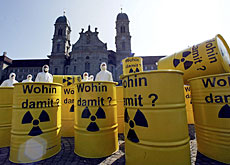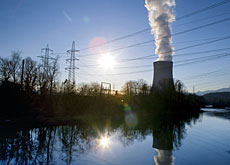Consensus sought for nuclear waste storage

Delegates at an international nuclear waste conference examining long-term waste management have put forward underground storage facilities as the best option.
Switzerland is also planning to use deep geological repositories in the future, although the government still has some way to go to win the public’s hearts and minds.
As climate change assumes ever-increasing importance to policymakers, nuclear power has re-emerged as a stronger candidate to supply Switzerland’s power needs.
But the country’s existing power plants are insufficient to meet medium-term power demands and pro-nuclear supporters say a second generation of nuclear facilities is required to avert the threatened power shortfall. Switzerland’s network of power stations still faces the problem of the disposal of radioactive waste, however.
Some 200 experts from 19 countries attending the conference in the Swiss capital, Bern, agreed that the solution lies in deep geological repositories. The aim is to ensure that no undue burden or responsibilities are passed on to future generations.
Speaking at the opening of the meeting, Swiss Energy Minister Moritz Leuenberger stressed the importance of allowing sufficient time for the repository implementation process and of ensuring transparency.
“Radioactive waste will remain hazardous for generations to come. Finding a safe solution takes time – time that can be used to allow critics to express their opinions and time that allows us to further develop the necessary technologies,” he said.
But nothing can be done without public approval, as was shown in a nuclear referendum in 2002. At that time voters in canton Nidwalden in central Switzerland turned down a proposal to build a nuclear waste repository in Wellenberg, fearing the safety of the facility.
There is consensus at international level that disposing of these wastes in a deep geological repository offers the required long-term safety and stability.
Some areas in Switzerland are considered suitable locations for underground storage because of specific geological layers that have hardly moved in the last 100,000 years.
However, such repositories do not mean new power plants can be built with impunity, according to Walter Steinmann, director of the Federal Energy Office. He pointed out that less than ten per cent of the world’s energy needs are supplied by nuclear power.
The International Atomic Energy Agency does not predict much greater potential for this form of energy generation.
“To have a prudent energy policy, we have to look first to energy efficiency and renewable energy resources,” Steinmann told swissinfo.
Clear government recognition
The nuclear industry considers itself back in favour now that the Swiss government has made it clear that it supports the option of nuclear power. The government’s willingness to pursue the deep geological repositories also supports the development of nuclear power.
At the beginning of 2008 the cabinet will release the criteria based on which six to eight potential locations will be selected. The approval of the people would then be sought through the normal democratic process.
The government has learned from its defeat over Wellenberg. From now on the local population will not be given the final say on the development of a storage site, rather it would be put to a national vote.
This is likely to take place in the next seven to 12 years, according to the energy authorities.
Storage facilities for low- and medium-grade nuclear waste could be operational by 2030, while facilities for highly-radioactive waste could be expected to come on stream ten years later.
In any case, there is no extreme urgency because the waste in question will not have cooled to the necessary 100 degrees by 2040 to allow it to be stored long term.
swissinfo, based on an article in German by Renat Künzi
The three-day International Conference on Geological Repositories entitled “A Common Objective, A Variety of Paths” concludes on October 17th.
This event is held every four years and is part of a series of conferences previously organised in Denver (1999) and Stockholm (2003).
The conference is organised by the Swiss National Cooperative for the Disposal of Radioactive Waste (Nagra), with the support of the International Atomic Energy Agency (IAEA) and others.
Radioactive wastes are waste types containing radioactive chemical elements that do not have a practical purpose. They are sometimes the products of a nuclear processes, such as nuclear fission. However, other industries not directly connected to the nuclear industry can produce large quantities of radioactive waste.
In Switzerland the producers of radioactive waste are responsible for its safe disposal in accordance with Swiss law.
Switzerland exports its highly radioactive waste to nuclear recycling plants in La Hague in France and in Sellafield, Britain. Switzerland has to take back the waste that cannot be reused.
Low and medium-grade radioactive waste from Swiss nuclear power plants as well as from medicine, industry and research is processed at a plant in Würenlingen, east of Basel.
Worldwide there are still no final storage facilities for highly radioactive nuclear waste.
Many in the nuclear industry are looking at the example of Finland where a nuclear waste facility is being built 500 metres below ground on Olkiluoto Island.
In Sweden various local authorities have approved projects. France wants to identify a location to build a storage site by 2015, most probably at Bure in the Aube region. The United States is considering a store in the Yukka mountains in Nevada state.
In Switzerland test drilling has indicated suitable geological sites at Wellenberg in canton Nidwalden and the winegrowing region north of Zurich.

In compliance with the JTI standards
More: SWI swissinfo.ch certified by the Journalism Trust Initiative


You can find an overview of ongoing debates with our journalists here. Please join us!
If you want to start a conversation about a topic raised in this article or want to report factual errors, email us at english@swissinfo.ch.